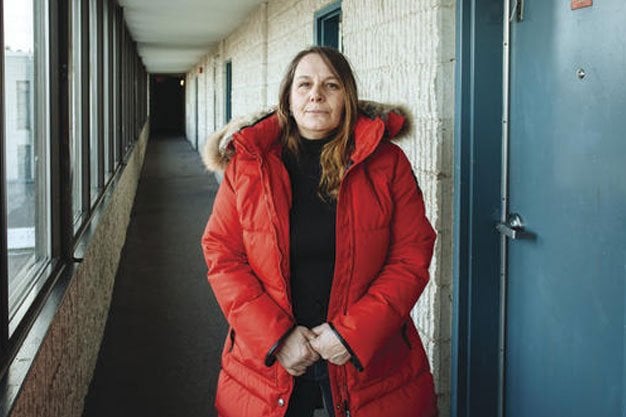
Teresa Villeneuve receives $917 monthly child support from her ex-partner.
As the mother of two children, Villeneuve would be entitled to $1,004 a month from social assistance, but that would mean giving the Ontario government permission to claw back her child support payments. Villeneuve made the decision to forgo social assistance.
Later, when she became destitute, Villeneuve gave in and applied for social assistance. However, the province denied her claim because her child support amounted to more than the base social assistance rate. She didn’t qualify for the housing expense. So instead of moving her family back to Barrie, Villeneuve and her children spent the holidays in a Scarborough shelter.
“What kind of society makes children support their parents who are struggling in the first place? It’s supposed to be all about what’s best for the children.”
Under changes brought in by the Harris government in 1997, the Family Law Act permits the Ministry of Community and Social Services to claw back support payments paid to custodial parents who are receiving Ontario Works (OW) assistance or benefits under the Ontario Disability Support Program (ODSP). Child support payments are treated as (non-earned) income by the provincial government, even though federal child support laws state that both parents have a financial obligation to their offspring.
“All children should continue to benefit from the financial means of both parents as if they were still together,” according to federal law.
The provincial government should not be allowed to take money from children whose custodial parent receives social assistance, says Ottawa-based lawyer Eric Letts. On September 4, 2015, Letts filed a $4.6 million class action suit against the Ministry of Community and Social Services.
The suit alleges that the human rights of thousands of Ontarians – one in four couples in Ontario is separated or divorced – are being violated by the diversion of child support from parents and children to provincial coffers.
Letts says many parents and their children are already subsisting on monthly social assistance payments that fall 30 per cent below the poverty line in Toronto. The clawback amounts to discriminatory conduct on the part of the ministry, he says, that’s putting at-risk children in further financial distress.
According to Letts, “Ontario has changed its thinking little since the era of Charles Dickens. Ontario’s family law has a patchwork history with roots in old church law, Victorian poor laws and ancient common law. It is a poor set of rules and processes to deal with 21st century families and modern Canadian values.”
Other provincial policies governing school communications, public health, sports programming and daycares all operate on a presumption that all Ontario children have only one home. In reality, 25 per cent of Ontario 13-year-olds have parents who live separately.
“The policy being challenged does more than financial harm,” he says. “It forces a child’s parents into conflict and litigation solely for the benefit of the provincial government.”
Kelly Duggan is another of Letts’s clients. Duggan left home at 16 and worked in various retail jobs until she was struck and injured by a car. Unable to work for three months, she began receiving Ontario Works. Since she couldn’t afford a lawyer, Duggan represented herself in a claim with the insurance company and settled for $3,500 in lost income. The entire amount went to OW.
At 17, Duggan became involved with a man. While pregnant, she says she was physically abused by her partner. She went back on OW after leaving him. Five days after giving birth, Duggan met with her worker, only to be told that her social assistance would be terminated unless she made a concerted effort to seek child support from her child’s father.
She succeeded in securing child support from her ex-partner several months later, only to be told that she had to assign the full amount to Ontario Works. She refused and is currently fighting the clawback at the Social Benefits Tribunal.
Duggan completed a college program the Friday before Christmas and began a new job after the holidays. She is no longer receiving social assistance.
“I’ve done everything in my power to create a good life for me and my son despite the hardship and difficulties with Ontario Works. I hope one day the system can be changed to better support families in similar situations.”
Fathers paying child support to ex-partners currently on social assistance aren’t happy about the provincial government clawbacks either.
Anupam Kakkar has his two children three days a week and pays $560 a month in child support. His children don’t see a penny of that because their mom has been receiving social assistance for the past nine years.
Kakkar says, “Children who are already at risk suffer more because parents have less money to pay for food, clothes, daycare, sports and other normal expenses.”
He thinks how much better life would be for his children if their mother were able to keep their child support.
news@nowtoronto.com | @nowtoronto












